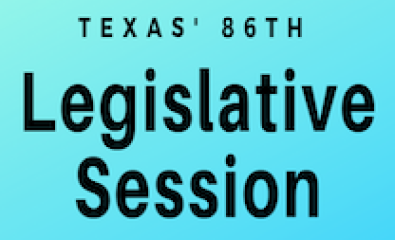
Our Glass is Half Full: Wins & Losses from the Lege
This month, on the heels of the end of the Texas legislature’s 86th session, Texas Appleseed will launch a campaign aimed at engaging our friends and supporters in considering what justice means to them. Our “Justice Is” campaign will not be just an opportunity to hear what justice looks like to the Texans we work for and alongside of — it is an opportunity for us to think deeply about how our work at Appleseed contributes to a more just Texas. Sometimes when we are engaged in the work, we forget to step back and consider how our advocacy contributes to the kind of Texas we all want to live and work in.
So how did Appleseed contribute to a more just Texas during the legislative session? This session, even when our priority bills didn’t pass, we raised awareness about the need for change. For example, while bail reform, one of our biggest criminal justice priorities this session, failed (again), the work we did with so many partners led to a greater awareness of the need for change. Those partners included the Texas Judicial Council — whose members we also worked with to raise awareness about the need to change the way that children are prosecuted for Class C (“fine only”) misdemeanors. Today, children are prosecuted in adult criminal court, where they face conviction, high fines and fees and all the problems associated with inability to pay, including driver’s license suspensions and the possibility of jail time once they turn 17. While this bill also did not pass — we had a remarkable, bipartisan team that we know will work together again in 2021.
We were also disappointed that we weren’t able to convince members to address the problems associated with driver’s license holds related to the Omnibase Program, which allows holds on a license renewal when people fail to pay fines and fees associated with Class C misdemeanors. Quite often the failure to pay is due to inability to pay — and placing a hold on someone’s driver’s license because they can’t pay a fine or fee is not only unjust and counterproductive, it is unconstitutional.Appleseed will continue to raise these issues in the interim, finding new voices to join us in the work during the 87th legislative session.
Though we still mourn these losses, for every (stinging, heartbreaking, disappointing) defeat we made significant gains toward a more just Texas, including:
-
HB 2697 (Meyer), which addressed the problem of “coerced debt” by expanding the definition of identity theft in Texas to include debt incurred through coercion in an abusive relationship.
-
HB 996 (Collier et al), which addressed “zombie debt” by prohibiting debt buyers from suing to collect a time-barred debt and prohibiting revival of those debts.
-
HB 2524 (Anderson), which substantially limits the ability of rent-to-own businesses to pursue criminal theft of service charges, significantly improving existing law.
-
SB 1637 (passed as amendment to SB 346) (Zaffirini), which builds upon changes made during the 2017 legislative session to increase fairness of criminal court procedures for people who cannot pay their fines and fees.
-
HB 811 (White), which addresses the intersection of our school-to-prison, youth homelessness, and foster care work by requiring schools to consider a student's foster care status or homelessness prior to any disciplinary action.
-
HB 692 (White) also puts the brakes on the school-to-prison pipeline for youth experiencing homelessness by ending out-of-school suspension for homeless students, barring “mandatory” disciplinary referrals named in the Education Code.
-
HB 123 (White), which makes it easier for homeless children and those in foster care to obtain ID documents like birth certificates or driver's licenses, documents critical to obtaining housing or a job, or enrolling in college.
-
SB 1707 (Lucio), helps to ensure that school police are not involved in routine student discipline — a best practice supported by law enforcement, students, and parents alike.
-
And while we can’t take all the credit for SB 11 (Taylor), the omnibus school safety bill, we were delighted that the legislature included two of our priority issues: a requirement that school districts have evidence-based threat assessment teams and language increasing child-specific training requirements for school police to include all Texas school districts. Currently, only officers in districts with an enrollment of 30,000 students or more are required to have training. We were also pleased to see an emphasis on increased access to mental health supports and services for students.
We also worked with broad coalitions to support good bills that were successful — like HB 2048 (Zerwas) which repeals the Driver Responsibility Program, and HB 2737(Wu) which directs the Texas Supreme Court and the Children’s Commission to provide guidance to judges on a range of issues, including the use of restraints during hearings.
While moping over bills lost, I came across a wonderful Molly Ivins quote that reminded me that even when we lose, we are privileged to be part of the fight:
[K]eep fightin’ for freedom and justice, beloveds, but don’t you forget to have fun doin’ it. Lord, let your laughter ring forth. Be outrageous, ridicule the fraidy-cats, rejoice in all the oddities that freedom can produce. And when you get through kickin’ ass and celebratin’ the sheer joy of a good fight, be sure to tell those who come after how much fun it was.
So though we didn’t pass every priority bill, and there’s still much fighting for freedom and justice ahead, we are thankful for the partnerships and friendships that were nurtured and built, and for the fun that we had (!) as we worked alongside so many remarkable allies this session. We will celebrate our half full glass and make ready for the next good fight. Onward!